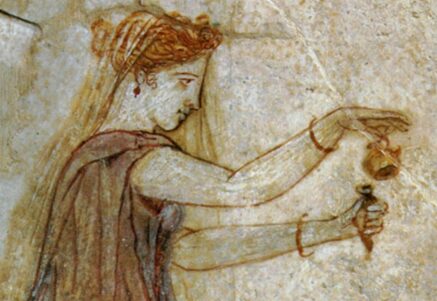Perfume in Ancient Civilizations
Perfume was more than just a pleasant scent in ancient civilizations; it held significant religious, medicinal, and social significance. Various civilizations harnessed the power of aromatic substances from nature to create unique fragrances, offering them to deities, using them for healing, and symbolizing status.
Egypt
One of the earliest civilizations to embrace perfume was ancient Egypt. Perfumes were integral to daily life and religious rituals. The word “perfume” itself originates from the Latin “per fumus,” meaning “through smoke,” as Egyptians would burn incense to please their gods. Egyptians used aromatic oils and resins for personal hygiene and beauty routines. They believed that these scents protected them from the heat and masked unpleasant odors. Lavender, sandalwood, cedar, and rose were common ingredients. Cleopatra was particularly famous for her love of perfumes, using them to enhance her allure. Perfumes were also crucial in religious rituals and the mummification process. Aromatic substances were used to embalm bodies, believing it would aid in the soul’s journey to the afterlife.
Mesopotamia
Mesopotamia, especially Sumer and Babylon, was another cradle of perfumery. Like the Egyptians, Mesopotamians used fragrances in religious ceremonies and daily life. They believed that burning incense would please the gods and purify the soul. Perfume was also a symbol of status for the royal class. Mesopotamians developed some of the basic chemical processes used in perfume making, such as distillation. They created complex fragrances using extracts from plants and trees.
Ancient Greece
The ancient Greeks adopted perfumery from the Egyptians and incorporated it into their own culture. They believed that perfumes had healing properties and used them in medicine. Hippocrates, the father of medicine, explored the medicinal qualities of aromatic plants. Perfume was also associated with the gods in Greek mythology. Aphrodite, the goddess of love and beauty, was often depicted as having a divine fragrance.
Roman Empire
The Romans embraced perfume as a status symbol. They used perfumes extensively in baths, homes, and personal care. The Romans were skilled perfumers and developed sophisticated techniques for creating fragrances.
Persian Empire
The Persian Empire was renowned for its beautiful gardens and production of aromatic oils. Persian rulers enjoyed luxurious baths infused with fragrant oils and used perfumes as symbols of their wealth and power.
India and the East
India has a rich history of using aromatic substances in religious rituals and Ayurvedic medicine. Sandalwood, jasmine, and musk were commonly used in perfumes.
